Free Keyword Research Tools
Splash your dream color Bring your home to lively Colors. We make it a priotity to offer flexible services to accomodate your needs
Google Trends
Google Trends visualizes the relative search popularity of a keyword over time.
For example, if we look at the term “costumes” for the past five years, we see that popularity spikes every October.

This is because of Halloween.
But how is this useful for keyword research?
For starters, it can help you plan your content calendar. Let’s assume you sell costumes online. Publishing or republishing a list of the “10 Scariest Halloween Costumes for 20XX” each September/October makes perfect sense.

Interest in “iPhone specs” peaks every September when Apple launches a new iPhone.
If you run a tech blog, it would make sense to update and republish any related posts every September.
Going beyond content calendars, Trends can also help avoid targeting the wrong keywords.
Take a look at these two:

If you could only create content for one of these keywords, which would you choose? It’d be the one with the highest search volume, right?
Not so fast, because search volumes are averages taken across many months or years.
If we check data for the past 12 months only in Google Trends, we see that searches for “apple watch series 5” recently overtook those for “apple watch series 3.”

So if you were running an ecommerce store and had to prioritize one of these keywords, it would almost certainly be “apple watch series 5.”
After all, searches for the Series 3 are only going to decrease as time goes on.
Keyword Generator
Keyword Generator finds up to 150 keyword ideas for any seed keyword.
For example, if we search for “bitcoin,” we get one hundred keyword ideas containing that word along with their estimated monthly search volumes.

We also see a list of 50 question-type queries.

For the first ten keywords on each list, we also show the Keyword Difficulty (KD) score. This is a number between 0-100 that estimates ranking difficulty. Generally speaking, the higher it is, the more backlinks you’ll need to rank.
SIDENOTE. Keyword Difficulty (KD) doesn’t take anything else into account besides backlinks. It’s important to take content quality, search intent, and website authority into account when assessing ranking difficulty. Learn more in this post.
Note that search volumes and KD scores are relative to the chosen country, which is the United States by default.
If you’re looking to rank elsewhere, just choose from one of the 170+ countries from the dropdown.

You can also use the Keyword Generator to find keyword ideas for Bing, YouTube, and Amazon. Just switch the search engine at the top of the page.

Keyword Surfer
Keyword Surfer is a free Chrome extension that shows estimated global and monthly search volumes for any query typed into Google.

Right now, Keyword Surfer shows local search volume estimates for 19 countries. These include the United States, the United Kingdom, Canada, Brazil, France, and Germany.
There’s also an option to turn global search volumes on or off.
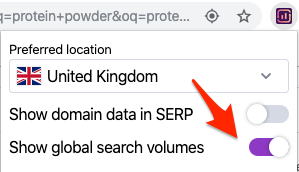
That said, these aren’t true global search volumes. It’s the total sum of searches from the 19 countries currently in their database.
Beyond this, the extension also adds search volume estimates to the autocomplete results:
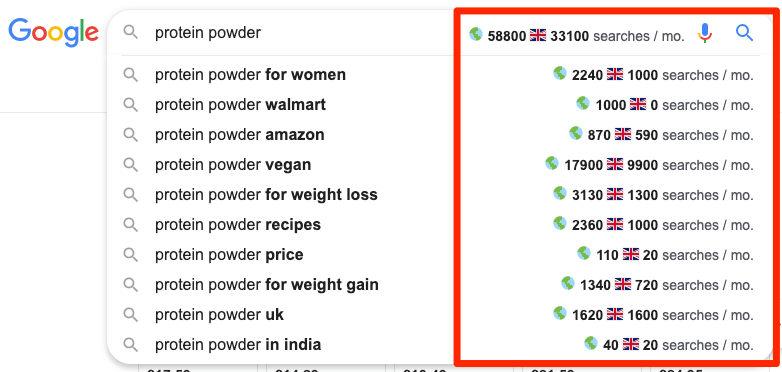
And shows 10 “similar” keywords in the search results:
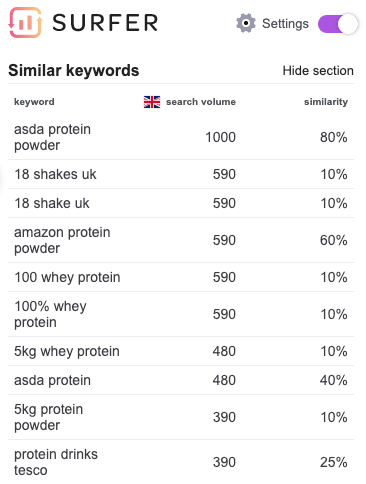
The only downside is that there’s no way to get search volumes in bulk.
That said, bulk research isn’t the aim of this extension. It’s more for assessing queries as you browse the web.
Keyworddit
Keyworddit is a unique tool that pulls keyword ideas from Reddit. Enter a subreddit, and it’ll mine the titles and comments of threads to find up to 500 keywords.
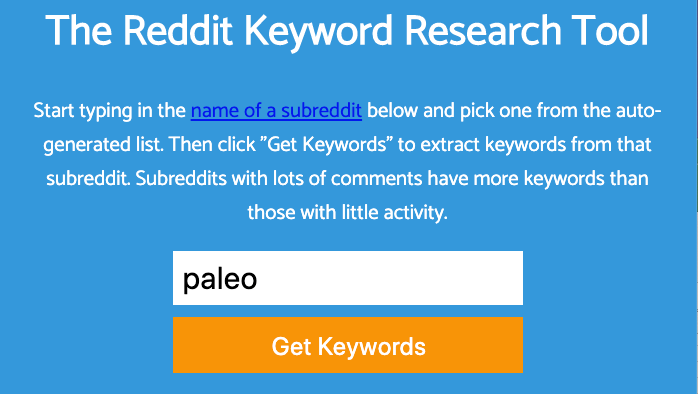
This tool is a fantastic starting point if you know little or nothing about a niche.
For example, if you want to start a blog about paleo dieting but know nothing about the topic, pull ideas from /r/paleo.
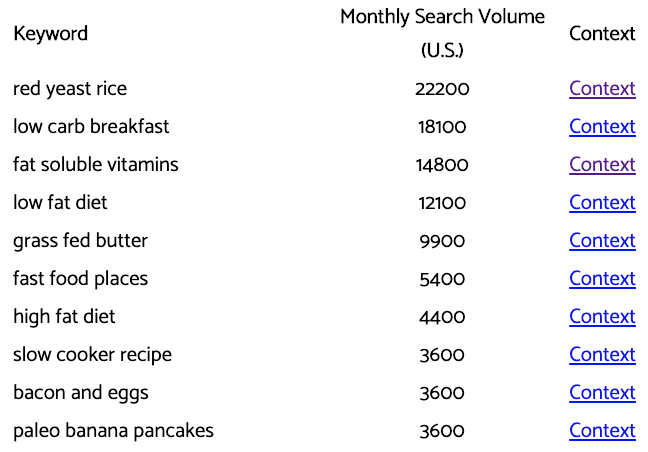
This tells you that paleo dieters care about things like:
- Low carb meals;
- Slow cooker recipes;
- Grass-fed produce;
- Etc.
It also tells you what kind of language they use to describe such things.
Beyond ideas, the tool pulls estimated US monthly search volumes for each keyword. That helps give you some idea about the popularity of each subtopic.
To learn more about a keyword, hit the “Context” link to pull up the threads in Google that the keywords were derived from.

Google Search Console
Google Search Console helps you track your website’s performance in organic search. This means it shows a lot of data about the keywords that you already rank for.
For example, take a look at the “Search results” report from our account. It shows the keywords that have sent the most traffic to the Ahrefs Blog over the past three months.
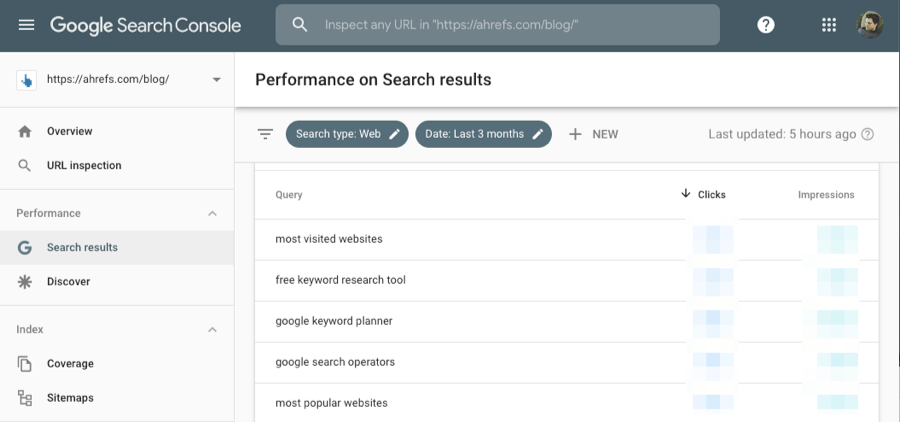
Let’s also toggle the “Average position” and “Average CTR” columns. These show each keyword’s average ranking position and click-through rate.

You can get a lot of useful insights from this report.
For instance, let’s say that you’re getting a lot of traffic from a keyword despite ranking in position 3-10. You may want to focus on ranking higher for that instead of targeting new keywords.

If your CTR is low despite ranking high, your page may be less than enticing in the search results. You can often fix this by improving your title tag or meta description.
But what about finding new keywords?
Sort the report by CTR from low to high. This often uncovers keywords that you’re ranking for but never targeted. If any of these have lots of impressions and a low click-through rate, it could be worth targeting that keyword with a new page.
For example, we rank in position 8 for “most searched person on Google.”

Questiondb
Questiondb finds the questions people are asking about a specific topic. It pulls these from a database of 48M questions sourced from Reddit.
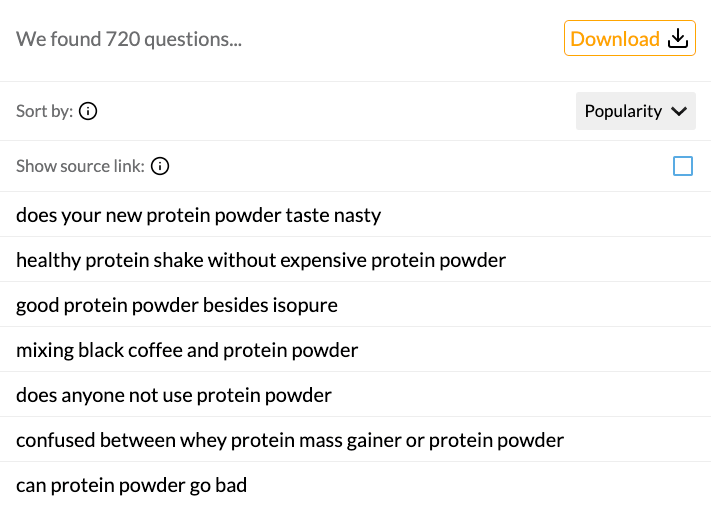
SIDENOTE. There are plans to expand data sources in the future.
Questions are sorted by popularity, but you can also sort by topic. This is a super useful feature because it also groups questions together.
For instance, let’s search for “protein powder” and sort by topic. All questions about vegan protein powder are now grouped together.
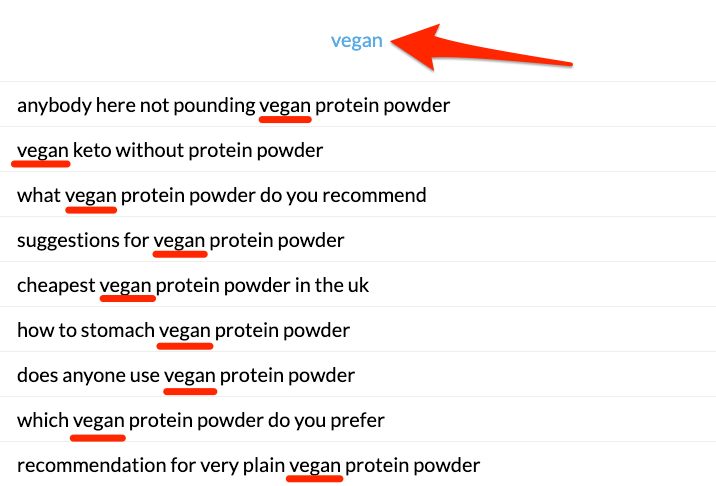
Same goes for those about keto protein powders:
This is useful when writing blog posts, as it helps you understand which questions to answer.
Speaking of answers, if you check the box to “Show source link,” a clickable link appears next to each question. This takes you to the thread itself.

If you browse the comments, you can often find answers fast, which speeds up content research.
All questions are exportable to CSV at the touch of a button.
Bulk Keyword Generator
Bulk Keyword Generator is a keyword research tool for local SEO. It generates keywords based on industry type.
To start, follow step 1 and choose a business type from the dropdown.
Google is perhaps the most powerful keyword research tool on the planet.
There’s the autocomplete feature for generating an almost infinite number of keyword ideas. But that’s only the tip of the iceberg when it comes to using Google for keyword research.
For starters, take notice of the “People also ask” box that shows up for some searches.